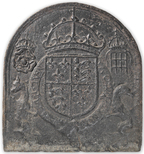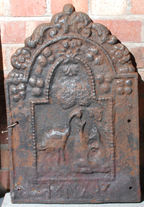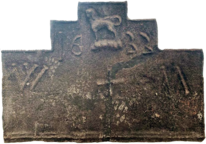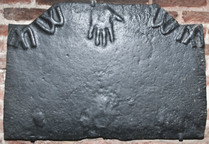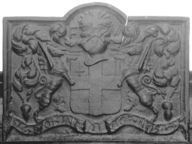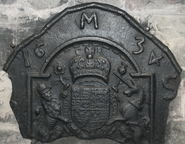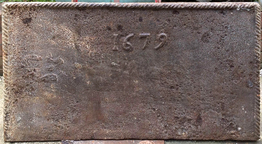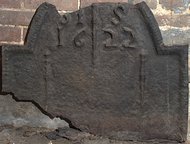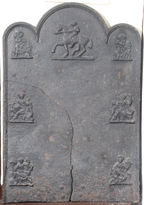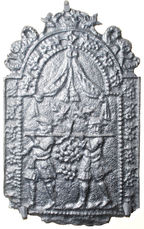-
1163
Description: Arched; ogee edging; Tudor royal shield, garter, crown and supporters (dragon and greyhound); top left, crowned Tudor rose; top right, crowned portcullis (grid of 6).
Notes: There are several firebacks with the Tudor royal arms that were probably produced in the Spanish Netherlands, perhaps illustrating the association between England and Spain through the marriage of Henry VIII and Katherine of Aragon. The firebacks differ in several small details, such as the form and rotation of the Garter motto, the style of the crown, the positioning of the supporters in relation to the Garter, and the form and size of the crowned rose and portcullis.; the placement of the rose and crown and of the crown above the portcullis suggest that they are stamps impressed over the original moulded design before casting. Bonhams auction, Oxford, 19 Feb 2020, lot 292.
Inscription: HONI SOIT QVI MAL I PENSE
Arms: Tudor royal
- Decoration tags:
- rounded arched (shape)
- cyma reversa/ogee (edging)
- carved stamps
- whole carved pattern
- heraldic
- armorial
- text
- animals
Manufactured: in the mid-16th century possibly in the Wallonia area of Luxemburg.
Current location: not known.
- Attached to series:
- Tudor royal armorial firebacks
- Continental Tudor royal armorial firebacks
-
233
Description: Arched rectangular central panel, bead edging, a stork, to the left, its beak in the top of a tall vase, a fox seated to the right, a tree behind; arched rectangular border, fillet edging, swags of fruit bunches (missing at the sides) suspended from ribbon, inscription below central panel; on top, symmetrical floral swirls and flowers.
Notes: The scene is drawn from 'The Fox and the Stork', one of Aesop's fables. A recasting. Formerly at Ffynnon Deilo, Pendoylan, Glamorgan.
Copies of this fireback are known.
Inscription: 16 NDW 97
- Decoration tags:
- 'Dutch' (shape)
- fillet (edging)
- whole carved pattern
- pictorial
- mythological
- text
- animals
- objects
Manufactured: in 1697 in the Siegerland area of Germany.
Current location: National History Museum, St Fagans, Glamorgan, Wales.
Museum number: 59.461 (part of the Welsh National History Museum museum group)
- Attached to series:
- 'Dutch' NDW series
-
1255
Description: Rectangular with two-stepped top; twisted rope edging (top and sides), reused frame moulding at bottom; top centre, stamp formed of a talbot statant guardant upon a wreath between separated date; initials formed of straight twisted rope lengths separated between lower shoulders; a cross below the crest.
Notes: Straight elements in the letters and numbers are formed of short lengths of twisted rope; curved elements appear to have been formed by hand drawing in the casting sand; the talbot crest has been seen on other firebacks indicating a common source, and is associated with firebacks with a stepped shape. Chard Auctions, 16 Mar 2023, lot 206 (£85, with two other firebacks).
Inscription: 16 33 / W + M
- Decoration tags:
- stepped (shape)
- rope (edging)
- simple stamps
- carved stamps
- individual letters
- individual numbers
- heraldic
- text
Manufactured: in 1633 in the Weald area of England.
Current location: not known.
- Attached to series:
- Stepped firebacks
- Talbot crest series
-
1113
Description: Quasi-rectangular with a three-facetted arch; top centre, left hand print; around each shoulder, M W mirrored.
Notes: The likelihood is that the M and W are formed of a double-V (virgo virginum) intended to symbolise the Virgin Mary and have an apotropaic (evil-averting) purpose. It may be of significance that hand prints seen on firebacks are always of the left hand.
Inscription: MW WM
- Decoration tags:
- rectangular with triple-facetted arch (shape)
- none (edging)
- simple stamps
- individual letters
- apotropaic
- text
- humans
Manufactured: in the early-17th century possibly in the Weald area of England.
Current location: in private hands, Crowborough, East Sussex, England.
- Attached to series:
- Hand print firebacks
-
146
Description: Arched rectangular shape; cavetto moulded edging; shield, helm, crest, supporters, mantling and motto of the Corporation of the City of London; initials split by crest; date split at ends of motto.
Notes: Shield: Argent, a cross gules, in the first quarter a sword in pale point upwards of the last; crest: on a wreath argent and gules a dragon's sinister wing argent, charged on the underside with a cross throughout gules; supporters: on either side a dragon argent charged on the undersides of the wings with a cross throughout gules; motto: Domine Dirige Nos - Lord Direct Us; the earliest illustration of the arms in this form was in 1609, but their use is older. Formerly part of the Ade Collection (from Grove Hill, Hellingly, Sussex). Inferior copies of this fireback were advertised in Kings Worthy Foundry's (Winchester) catalogue in the mid-20th century.
Copies of this fireback are known.
Inscription: F W / 16 DOMINE DIRIGE NOS 59
Arms: Corporation of the City of London
- Decoration tags:
- rectangular with round arch (shape)
- cavetto (edging)
- whole carved pattern
- individual letters
- armorial
- text
Manufactured: in 1659 possibly in the Weald area of England.
Current location: Hastings Museum and Art Gallery, John's Place, Bohemia Road, Hastings, East Sussex, England.
Museum number: HASMG: 1952.51.53 (part of the Hastings Museum museum group)
- Attached to series:
- Civic firebacks
-
1076
Description: Fragment; arched rectangular fireback with embattled, cavetto-moulded edging; English Stuart royal shield, Garter, crown and supporters, stemmed rose and stemmed thistle, respectively, to left and right of crown; initials CR above crown; all within a plain border, with short lengths of twisted rope edging containing, at the top, the initial M between a split date; initials (only S surviving) below date.
Notes: A Carolean composite fireback. The armorial fireback includes stylistic elements - the form of the unicorn and of the harp - identical to those on two series of firebacks dated 1618 and 1619, indicating the work of the same pattern-maker; its width is 490mm.
Inscription: M / 1634 / [?] S / C R
Arms: English Stuart royal (Charles I)
- Decoration tags:
- rounded arched (shape)
- rope (edging)
- carved pattern panels
- composite
- individual letters
- individual numbers
- heraldic
- armorial
- text
Manufactured: in 1634 possibly in the Forest of Dean area of England.
Current location: Black and White House Museum, The Old House, High Town, Hereford, Herefordshire, England.
-
1232
Description: Rectangular; twisted rope edging on top and sides; date placed slightly right of centre near top.
Notes: A similar fireback with slightly different proportions has the same date using the same numerals.
Inscription: 1679
- Decoration tags:
- rectangular (shape)
- rope (edging)
- carved stamps
- individual numbers
- text
Manufactured: in 1679 in the Weald area of England.
Current location: not known.
- Attached to series:
- Date only firebacks
- 1679 Wealden series
-
1310
Description: Fragment; arched rectangular shape; gadrooned edging (top and sides); initials, in separate stamps, at top of arch; date probably in separate stamps, below, split by spindle; spindle used as a stamp repeated three times, one between date and initial stamps, the other two below to left and right.
Notes: Makes use of the same backing board as other firebacks in this series, and the same three spindles but with other initials; it may have originated in the Cuckfield area of Sussex, where most examples have been noted.
Inscription: SI S / 16 22
- Decoration tags:
- rectangular with round arch (shape)
- gadrooned (edging)
- simple stamps
- individual letters
- individual numbers
- text
- objects
Manufactured: in 1622 possibly at Cuckfield Furnace in the Weald area of England.
Current location: in private hands, Horsted Keynes, West Sussex, England.
- Attached to series:
- Spindle series
- Spindle/distaff firebacks
-
427
Description: Rectangular with three sem-circular arches on top, the middle arch higher and wider than the others; ovolo-moulded edging (top and sides); top centre, equestrian figure stamp; six small stamps of iconic figures down the sides, arranged in two columns.
Notes: An unusual fireback with stamps about 90mm high; the stamps are likely to have been cast from brass or iron mantelpiece ornaments, popular in the Victorian period. Formerly part of the J. H. Every collection.
- Decoration tags:
- rectangular with three arches (shape)
- ovolo (edging)
- carved stamps
- pictorial
- animals
- humans
Manufactured: in the 19th century in England.
Current location: Anne of Cleves House, Southover High Street, Lewes, East Sussex, England.
Museum number: 1944.24.089 (part of the Sussex Archaeological Society museum group)
- Attached to series:
- Ornament stamp firebacks
- Metalware stamp firebacks
-
539
Description: Arched rectangular central panel with bead-on-fillet edging; pictorial scene of two men in mid-17t century dress carrying a large bunch of grapes on a pole between them, above them drapery; arched rectangular border with fillet edging; cascade of flowers around arch and down sides; on top, central crown with descending serpents, an urn on each shoulder of the plate.
Notes: The scene depicts Joshua and Caleb returning from Canaan with a bunch of grapes (Numbers 13: 23-4). Mitford collection, Petworth House.
Manufactured: in the late-17th century possibly in the Siegerland area of Germany.
Current location: Petworth House, Petworth, West Sussex, England.
Museum number: NT/PET/M/94 (part of the National Trust museum group)
